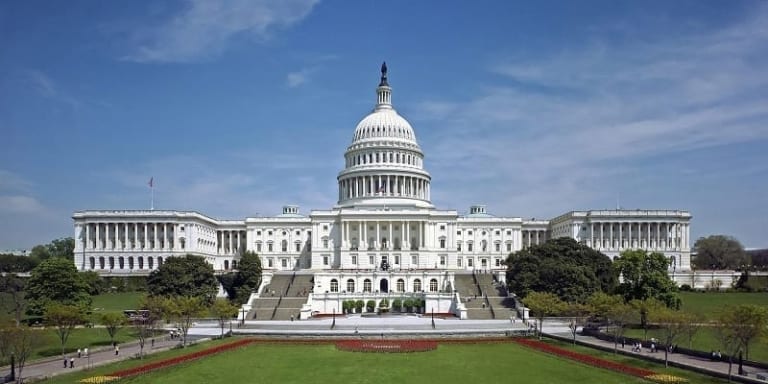
I. Legislative Branch
1) Legislation
Lawmakers Introduce Resolutions Condemning Iran for Persecution of Women and Protesters. On September 29, Senators Jim Risch (R-Idaho), Chris Coons (D-Delaware), and James Lankford (R-Oklahoma) introduced a resolution condemning Iran for the recent killing of Mahsa Amini, a 22-year-old Kurdish Iranian woman murdered by Iran’s Guidance Patrol—commonly referred to as the “morality police”—after being detained for allegedly wearing “improper” clothing. That same day, Senators Bob Menendez (D-New Jersey) and Marsha Blackburn (R-Tennessee) joined House Representatives Tom Malinowski (D-New Jersey) and Claudia Tenney (R-New York) in introducing concurrent resolutions calling on the international community to support protestors in Iran. A separate resolution, H.Res. 1397, was introduced on September 28 by Representative Young Kim (R-California), condemning the torture and murder of Amini as well as Iran’s violent crackdowns on protesters. In a statement regarding his bill, Senator Risch criticized President Biden’s “blind pursuit” of a nuclear deal with Iran and called on the administration to hold Iran accountable for its human rights abuses.
Senator Shaheen Introduces Bill to Repatriate Syrians Detained by IS. On September 28, Senator Jeanne Shaheen (D-New Hampshire) introduced S. 4996, a bill to amend the National Defense Authorization Act for fiscal year 2020 to modify the establishment of a coordinator for detained members of the so-called Islamic State (IS) and for displaced persons in Syria. The bill would create a senior position in the State Department, to be occupied by an official mandated with carrying out a new US policy of repatriating residents of refugee camps in Syria, with a focus on closing the camps as quickly as possible. According to Senator Shaheen, the current deterioration of the camps is both a “humanitarian disaster” and a security risk.
2) Personnel and Correspondence
Egypt Human Rights Caucus Chairs Express Concern to Biden Administration. On September 27, Representatives Don Beyer (D-Virginia) and Tom Malinowski (D-New Jersey), co-chairs of the congressional Egypt Human Rights Caucus, released a statement expressing concern over the Biden administration’s release of $75 million in foreign military funding to Egypt in the 2021 fiscal year. Although the funding was released on the administration’s assessment that Egypt had made progress on human rights, the representatives argued that human rights groups have documented Egypt’s increased detention of political prisoners and its lack of progress on due process rules during this funding period. The representatives urged the administration to work with Congress to make sure that US funding is not “bolstering human rights abusers.”
Representative Meeks Condemns Iranian Attack in Iraqi Kurdistan. On September 28, Representative Gregory Meeks (D-New York), Chair of the House Foreign Affairs Committee, condemned Iranian missile attacks in Kurdistan Region of Iraq. In a tweet, Representative Meeks said, “I stand with the people and government of Iraq in the face of these deplorable, illegal attacks.”
Senator Brown Speaks on Bipartisan Support for Israel and Iran Negotiations. On September 28, Senator Sherrod Brown (D-Ohio) expressed his conviction that “the mainstream Democratic party” and “most Republicans” support Israel. Brown’s statement follows Representative Rashida Tlaib’s (D-Michigan) comments that support for Israel is incompatible with “progressive values.” Senator Brown also expressed his opinion that a nuclear deal with Iran is “not top of mind for Senate Democrats.”
House Democrats Choose Representative Cicilline to Head MENA Subcommittee. Democratic members of the House Foreign Affairs Committee have reportedly chosen Representative David Cicilline (D-Rhode Island) to chair the Middle East, North Africa, and Global Counterterrorism subcommittee. In a statement, Representative Cicilline stated that the subcommittee must “address humanitarian crises, human rights abuses, and political upheaval throughout the region.” Cicilline succeeds Rep. Ted Deutch who resigned from Congress September 30 to head the American Jewish Committee.
II. Executive Branch
1) The White House
Biden Administration Has Withheld Portions of the Jamal Khashoggi Intelligence Report. The Biden administration has reportedly not fully declassified an intelligence report on the killing of former Washington Post columnist Jamal Khashoggi. According to reports, the Public Interest Declassification Board—a panel of experts appointed to advocate for governmental transparency in national security matters—recommended in June that the administration release the full report, just before President Biden’s meeting with Crown Prince Mohammed bin Salman, who is suspected to have ordered the killing.
Biden Administration Condemns Iranian Attacks in Iraqi Kurdistan. On September 28, National Security Advisor Jake Sullivan condemned Iranian drone and missile attacks launched in the Kurdistan Region in northern Iraq earlier that same day. State Department Spokesperson Ned Price and US CENTCOM joined the condemnation as well, with the latter announcing that it had brought down an Iranian drone heading in the direction of Erbil that day. Thirteen people were killed and fifty-eight were wounded in the attacks.
President Biden Signs FY 23 Presidential Determination on Refugee Admissions. On September 27, President Biden signed the Presidential Determination on Refugee Admission for the 2023 fiscal year, setting the administration’s admissions cap at 125,000. Fiscal year 2022 saw the same limit set, but the United States actually admitted fewer than 20,000 refugees during that period.
National Security Advisor Sullivan Meets with Israeli Counterpart. On September 28, National Security Advisor Jake Sullivan hosted Israeli National Security Advisor Eyal Hulata at the White House. The two officials discussed the launch of the US-Israel Strategic High-Level Dialogue on Technology, the threat of Iran, the importance of concluding maritime border talks between Lebanon and Israel, and the need to de-escalate tensions in the West Bank.
National Security Advisor Sullivan Discusses War in Ukraine with Turkish Official. On October 2, National Security Advisor Jake Sullivan met with Ibrahim Kalin, Chief Advisor to the President of Turkey. The two officials discussed the war in Ukraine and condemned Russia’s annexation of Ukrainian territory. Sullivan also thanked Kalin for Turkey’s help in securing the export of Ukrainian grain and in freeing prisoners of war held in Russia, including two US citizens.
2) Department of State
State Department Calls on Israel to Investigate Death of Palestinian Child in the West Bank. On September 28, State Department Deputy Spokesperson Vedant Patel called for a “thorough and immediate investigation” into the death of seven-year-old Rayyan Yaser Suleiman, who collapsed and died as Israeli soldiers chased him in the West Bank. Suleiman’s father said that he thinks the chase caused the boy to die “on the spot from fear.” An Israeli Army spokesman said that an inquiry has shown “no connection” between IDF searches in the area and Suleiman’s death.
State Department Announces Sanctions on Two Chinese Companies Working with Iran. On September 29, the State Department announced new sanctions on two Chinese companies, Zhonggu Storage and Transportation and WS Shipping Co., for their work with Iranian petroleum and petrochemical companies. The State Department called on any entities working with Iranian oil and petrochemical companies to “cease and desist immediately if they wish to avoid US sanctions.”
State Department Official Says US Still Against Assad Regime Normalization. On September 29, an unnamed State Department official reportedly said that the United States “will not improve its diplomatic relations with the Assad regime,” citing its “atrocities” against the people of Syria over the last decade. The official also stated that the United States does not support other countries’ normalization of relations with Syria. In recent years, countries like Jordan, the UAE, and Bahrain have begun to mend ties with Assad.
State Department Says US Citizen Killed in Iranian Strikes in Iraq. On September 29, the US State Department confirmed that Omar Mahmoudzadeh, an American citizen, was killed in Iranian rocket attacks in the Kurdistan Region earlier this week.
US Ambassador to Israel Announces 24/7 Allenby Bridge Border Crossing. On September 28, US Ambassador to Israel Tom Nides announced that the Allenby–King Hussein Bridge border crossing, which connects the occupied West Bank to Jordan, will begin a pilot program on October 24 that will keep the border open 24 hours a day, 7 days a week. Both President Biden and US Assistant Secretary for Near Eastern Affairs Barbara Leaf have pushed the Israelis to enact this change in recent months. The crossing, which is chiefly used by Palestinians traveling to Jordan to use its international airport, has suffered from long queues that can make crossing the border take up to an entire day.
US Warns Sudan Against Hosting Russian Military Facility. On September 27, US Ambassador to Sudan John Godfrey warned the Sudanese government against the potential implementation of a 2017 agreement with Russia to open a Red Sea military base. The agreement was part of a deal signed by former Sudanese President Omar al-Bashir, who was subsequently ousted in a 2019 wave of protests that ultimately led to a military coup.
Assistant Secretary Trudeau Travels to UAE. On September 28, Acting Assistant Secretary for Global Public Affairs Elizabeth Kennedy Trudeau began a trip to the Middle East and Asia, which will include a visit to the United Arab Emirates. While in the UAE, Trudeau will visit the Dubai Policy Research Center and the Global Public Affairs Dubai Regional Media Hub, where she will engage in media appearances.
US and Israeli Officials Hold Strategic Technology Dialogue. On September 28, US officials and an Israeli delegation led by Israeli Minister of Innovation, Science, and Technology Orit Farkash-Hacohen participated in a strategic technology dialogue in Washington. The dialogue was arranged as part of the “Jerusalem Declaration,” which was signed by President Biden in July, and which aims to increase collaboration with Israel in critical technology like artificial intelligence.
Secretary Blinken Calls Saudi Foreign Minister. On October 1, Secretary of State Antony Blinken called Saudi Foreign Minister Faisal bin Farhan Al Saud to discuss the October 2 expiration of a UN mediated truce in Yemen. Secretary Blinken thanked Al Saud for Saudi Arabia’s efforts in previously agreeing to extend the truce and highlighted the benefits of truce expansion, including the payment of civil servants, the opening of roads in Taiz, and the expansion of commercial flights out of Sanaa. The leaders also discussed the bilateral US-Saudi relationship and the war in Ukraine.
State Department Releases Statement on Temporary Release of US Citizens in Iran. On October 1, the State Department expressed gratitude for Iran’s having given travel permission to a US citizen who was previously convicted by Tehran for espionage so that he could receive urgent medical treatment. Baquer Namazi and his son Siamak Namazi were both imprisoned in Iran on charges of espionage in 2016, and while the father was released from prison in 2022, he was banned from traveling outside of the country. His son was also granted a temporary, one-week furlough to spend time with his father. State Department Spokesperson Ned Price thanked several US allies, including Qatar, Oman, and the UAE, for their work in helping the Namazis, and said that efforts are “far from over.”
Lebanon Receives Proposal from Hochstein Regarding Border Demarcation with Israel. On October 1, US Ambassador to Lebanon Dorothy Shea delivered a proposal from Amos Hochstein, US mediator between Lebanon and Israel, to Lebanese President Michel Aoun, caretaker Prime Minister Najib Mikati, and Speaker of Parliament Nabih Berri. Hochstein has been working on brokering an agreement on demarcating the two countries’ maritime border since October 2021.
3) Department of Defense
DoD Announces Weapons Sale to Kuwait. On September 27, the US Department of Defense announced that the State Department has approved a potential $250 million sale of M1A2K tank equipment and ammunition to Kuwait. According to the statement, the equipment will help Kuwait enhance its deterrence and defense capabilities against land-based threats. Congress has been notified of this potential sale, as required by law.
DoD Faces Criticism over Newly Released Report on Civilian Deaths. On September 27, the Department of Defense released its annual report on civilian casualties in 2021, as required by the 2018 National Defense Authorization Act. The report lists only twelve civilian killings reported as credible. However, critics have said these numbers are far too low. Emily Tripp, director of Airwars—an organization that monitors and assesses civilian harm from international military actions—stated that at least a dozen civilian casualties in Syria that Airwars has documented “appear unaccounted for in the report.”
US Coast Guard Seizes $85 Million of Heroin in Gulf of Oman. On September 27, a US Coast Guard ship seized $85 million of heroin from a fishing vessel crossing international waters in the Gulf of Oman. The Coast Guard also captured additional ships carrying heroin and other drugs in the Gulf of Oman in August and May of this year.
4) Department of the Treasury
Treasury Department Announces Sanctions on Companies Working with Iran. On September 29, the US Department of the Treasury’s Office of Foreign Assets Control announced sanctions on companies from the UAE, Hong Kong, and India that have “facilitated financial transfers and shipping of Iranian petroleum and petrochemical products.” These companies have reportedly worked with two sanctioned Iranian companies, Triliance Petrochemical and Persian Gulf Petrochemical Industry Commercial Co. According to the statement, the department plans to continue pursuing sanctions on Iran’s petroleum and petrochemical sales if the country continues to accelerate its nuclear program in violation of the Joint Comprehensive Plan of Action.


